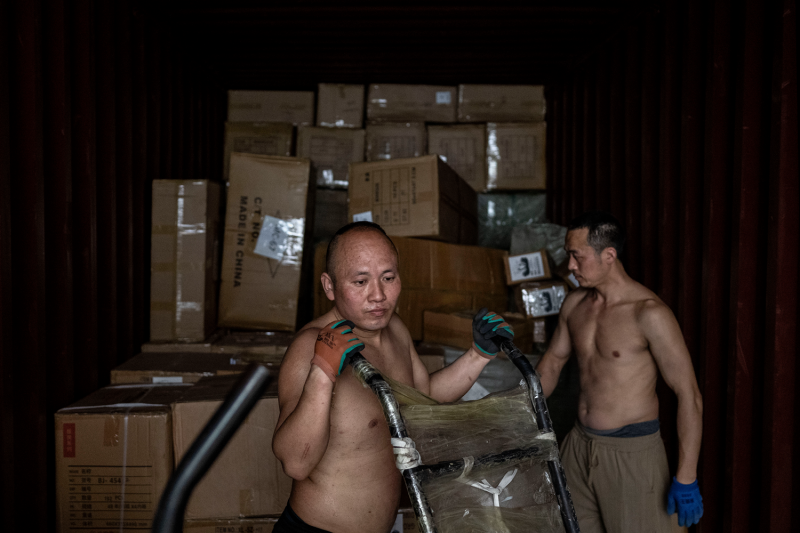U.S., U.K. Announce Major Trade Deal

U.S., U.K. Announce Major Trade Deal
This is the White House’s first major trade agreement since it issued sweeping reciprocal tariffs last month.
U.S. President Donald Trump (left) shakes hands with British ambassador to the United States Peter Mandelson after making a trade announcement at the White House in Washington on May 8. Jim Watson/AFP via Getty Images
The United States and United Kingdom announced a “breakthrough” trade deal on Thursday that will lift some (but not all) U.S. tariffs on British goods. Both U.S. President Donald Trump and British Prime Minister Keir Starmer heralded the agreement as a vital step toward improving trade relations.
“We are the first country to secure such a deal with the United States, and in an era of global insecurity and instability, that is so important,” Starmer said on Thursday. This is the first trade deal that the United States has reached since the White House’s sweeping reciprocal tariffs wreaked havoc on global stock markets last month and raised fears of a U.S. recession.
The United States and United Kingdom announced a “breakthrough” trade deal on Thursday that will lift some (but not all) U.S. tariffs on British goods. Both U.S. President Donald Trump and British Prime Minister Keir Starmer heralded the agreement as a vital step toward improving trade relations.
“We are the first country to secure such a deal with the United States, and in an era of global insecurity and instability, that is so important,” Starmer said on Thursday. This is the first trade deal that the United States has reached since the White House’s sweeping reciprocal tariffs wreaked havoc on global stock markets last month and raised fears of a U.S. recession.
Under the framework agreement, Washington will lift 25 percent levies on British steel and aluminum, cut duties on almost all British car imports from 27.5 percent to 10 percent, and allow Rolls-Royce engines and plane parts to enter tariff-free. In return, U.S. companies will have better market access to British beef, ethanol, and other farm products worth around $5 billion; and London will commit to purchasing $10 billion worth of Boeing planes.
Notably, though, Trump’s baseline 10 percent reciprocal duty on most British goods will remain in place.
“The U.S.-U.K. skinny deal is a modest improvement compared to the reality before its announcement,” Ryan Bourne, an economist at the Cato Institute, told FP’s World Brief. “But with most U.S. tariffs still in place and a fairly narrow overall scope of the deal, we remain in a less free trading environment than the pre-Trump status quo and a far worse situation than if this was a comprehensive free trade agreement.”
This post is part of FP’s ongoing coverage of the Trump administration. Follow along here.
Alexandra Sharp is the World Brief writer at Foreign Policy. X: @AlexandraSSharp
More from Foreign Policy
-

Eight people dressed in camouflage military combat uniforms wade across a river, the water up to their waists. The soldiers carry large backpacks along with their rifles. Snowcapped mountains and a thick forest of evergreen trees loom in the distance. Get Ready for the Aleutian Island Crisis
As conflict heats up in the Arctic, foreign adversaries eye Alaskan territory.
-

U.S. President Donald Trump speaks to reporters before boarding Air Force One at Morristown Municipal Airport in Morristown, New Jersey, on April 27. Trump’s First 100 Days Reveal a ‘Strongman’s’ Unprecedented Weakness
No U.S. president has ever surrendered global power so quickly.
-

An elderly man and woman sit on the ground, the man on his knees as he sorts through something on the ground. Behind him are a rusted cart and bicycle in front of a paint-smeared concrete wall and a battered corrugated metal sign with the words USAID: From the American people” on it. What Trump’s New Budget Says About U.S. Foreign Policy
The president wants to significantly pull back on many of America’s traditional global engagements while spending more on the border and defense.
-

U.S. President Donald Trump listens to Secretary of State Marco Rubio at a cabinet meeting in the White House in Washington, D.C. Rubio’s Reorganization Plan Is a Wrecking Ball
The State Department revamp goes far beyond streamlining—it will devalue human rights and strip away critical expertise.












Join the Conversation
Commenting on this and other recent articles is just one benefit of a Foreign Policy subscription.
Already a subscriber?
.
Subscribe
Subscribe
View Comments
Join the Conversation
Join the conversation on this and other recent Foreign Policy articles when you subscribe now.
Subscribe
Subscribe
Not your account?
View Comments
Join the Conversation
Please follow our comment guidelines, stay on topic, and be civil, courteous, and respectful of others’ beliefs.
Change your username |
Log out
Change your username:
CANCEL
Confirm your username to get started.
The default username below has been generated using the first name and last initial on your FP subscriber account. Usernames may be updated at any time and must not contain inappropriate or offensive language.